动词不定式与动名词作宾语的区别
动名词与不定式的用法与区别

动名词与不定式的用法与区别动名词(Gerund)和不定式(Infinitive)是英语中常见的两种非谓语动词形式。
它们在句子中可以起到多种不同的功能,但在使用上有着一些区别。
本文将详细探讨动名词与不定式的用法与区别。
一、动名词的用法动名词是将动词+ing形式构成的,可以作为主语、宾语、表语、状语等多种用途。
1. 作主语动名词可以作为句子的主语,通常表示一种行为或状态。
例:Swimming is good for health.(游泳有益于健康。
)2. 作宾语动名词可以作及物动词的宾语,表示被动或被动态。
例:She enjoys reading books.(她喜欢读书。
)3. 作表语动名词可以作表语,通常与连系动词be或感官动词连用,表示主语的行为或状态。
例:Her hobby is painting.(她的爱好是绘画。
)4. 作状语动名词可以作状语,表示行为发生的时间、原因、结果等。
例:He made money by selling paintings.(他通过卖画赚钱。
)二、不定式的用法不定式是动词原形,通常由to + 动词构成,可以用作名词、形容词或副词。
1. 作名词不定式可以作名词,作主语、表语、宾语等。
例:To learn a foreign language is important.(学一门外语很重要。
)2. 作形容词不定式可以作形容词,修饰名词或代词。
例:She has a lot of work to do.(她有很多工作要做。
)3. 作副词不定式可以作副词,修饰动词、形容词或副词。
例:He worked hard to pass the exam.(他努力学习以通过考试。
)三、动名词与不定式的区别虽然动名词和不定式都是非谓语动词形式,但它们在使用上有一些区别。
1. 主动与被动动名词通常表示主动意义,而不定式可以表示被动意义。
例:I enjoy swimming.(我喜欢游泳。
动词不定式和动名词作主语和宾语的用法
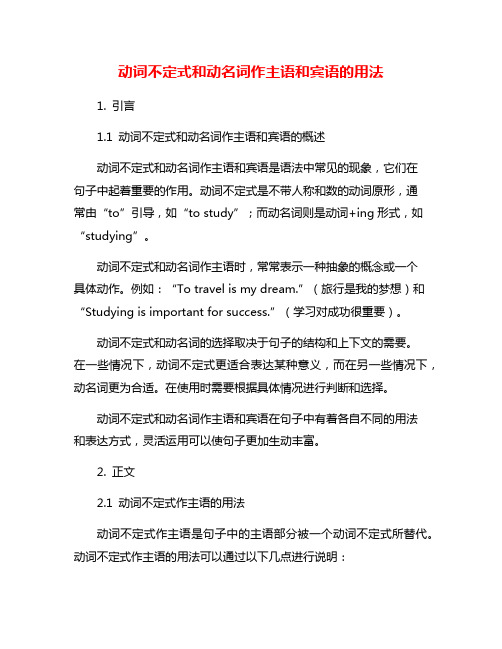
动词不定式和动名词作主语和宾语的用法1. 引言1.1 动词不定式和动名词作主语和宾语的概述动词不定式和动名词作主语和宾语是语法中常见的现象,它们在句子中起着重要的作用。
动词不定式是不带人称和数的动词原形,通常由“to”引导,如“to study”;而动名词则是动词+ing形式,如“studying”。
动词不定式和动名词作主语时,常常表示一种抽象的概念或一个具体动作。
例如:“To travel is my dream.”(旅行是我的梦想)和“Studying is important for success.”(学习对成功很重要)。
动词不定式和动名词的选择取决于句子的结构和上下文的需要。
在一些情况下,动词不定式更适合表达某种意义,而在另一些情况下,动名词更为合适。
在使用时需要根据具体情况进行判断和选择。
动词不定式和动名词作主语和宾语在句子中有着各自不同的用法和表达方式,灵活运用可以使句子更加生动丰富。
2. 正文2.1 动词不定式作主语的用法动词不定式作主语是句子中的主语部分被一个动词不定式所替代。
动词不定式作主语的用法可以通过以下几点进行说明:1. 表示一种行为或动作的意图或目的。
例如:"学习是成功的关键。
"2. 表示一种抽象的概念或观念。
例如:"帮助他人是一种美德。
"3. 在句子中作为主语时,通常放在句首位置。
例如:"抽烟会影响健康。
"4. 动词不定式作主语时,动词不定式通常是不带to的形式。
例如:"去旅行是我的梦想。
"5. 在某些情况下,动词不定式作主语时可以使用to的形式。
例如:"To learn a new language is challenging."动词不定式作主语可以使句子更加简洁明了,同时也可以突出所表达的意思或观点。
在写作中,我们可以适当运用动词不定式作主语来丰富句子结构,提高文章的表达力和逻辑性。
动名词与不定式的区别
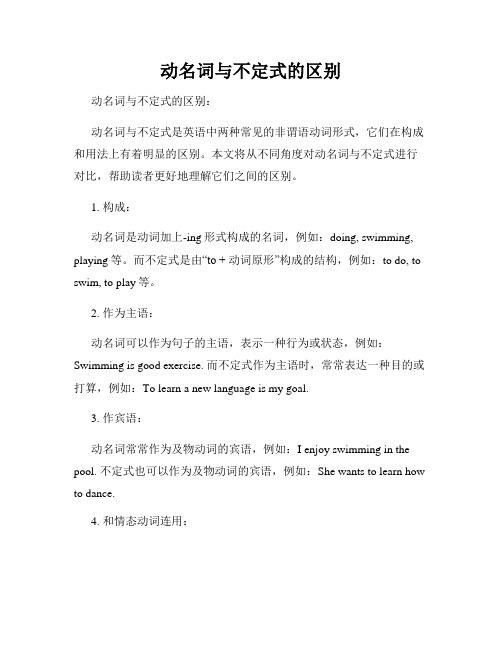
动名词与不定式的区别动名词与不定式的区别:动名词与不定式是英语中两种常见的非谓语动词形式,它们在构成和用法上有着明显的区别。
本文将从不同角度对动名词与不定式进行对比,帮助读者更好地理解它们之间的区别。
1. 构成:动名词是动词加上-ing形式构成的名词,例如:doing, swimming, playing等。
而不定式是由“to + 动词原形”构成的结构,例如:to do, to swim, to play等。
2. 作为主语:动名词可以作为句子的主语,表示一种行为或状态,例如:Swimming is good exercise. 而不定式作为主语时,常常表达一种目的或打算,例如:To learn a new language is my goal.3. 作宾语:动名词常常作为及物动词的宾语,例如:I enjoy swimming in the pool. 不定式也可以作为及物动词的宾语,例如:She wants to learn how to dance.4. 和情态动词连用:当动名词和情态动词连用时,情态动词后面必须跟动名词形式,例如:I can't stand smoking. 而不定式和情态动词连用时,情态动词后跟不定式的原形,例如:She must study hard to pass the exam.5. 表达目的:动名词常用来表达一个动作或状态的目的,例如:I went to the gym for swimming. 而不定式也可以表达目的,例如:She walked fast tocatch the bus.通过以上对比,我们可以清楚地看到动名词与不定式在用法上的区别。
在实际运用中,我们需要根据句子的语境和需要选择合适的形式,以确保句子表达准确清晰。
希望本文的对比能帮助读者更好地理解动名词与不定式之间的区别,提高英语写作和表达的能力。
动词不定式与动名词的区别及使用方法
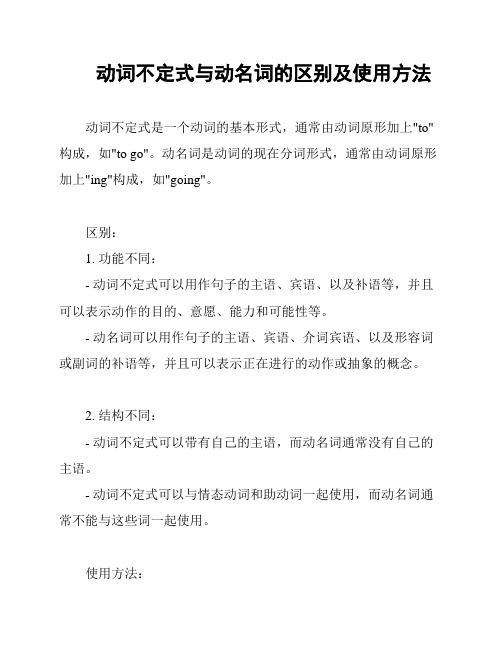
动词不定式与动名词的区别及使用方法动词不定式是一个动词的基本形式,通常由动词原形加上"to"构成,如"to go"。
动名词是动词的现在分词形式,通常由动词原形加上"ing"构成,如"going"。
区别:1. 功能不同:- 动词不定式可以用作句子的主语、宾语、以及补语等,并且可以表示动作的目的、意愿、能力和可能性等。
- 动名词可以用作句子的主语、宾语、介词宾语、以及形容词或副词的补语等,并且可以表示正在进行的动作或抽象的概念。
2. 结构不同:- 动词不定式可以带有自己的主语,而动名词通常没有自己的主语。
- 动词不定式可以与情态动词和助动词一起使用,而动名词通常不能与这些词一起使用。
使用方法:1. 动词不定式的使用:- 作主语:To travel is my dream.- 作宾语:I want to go on a vacation.- 表示目的:I study hard to pass the exam.- 表示意愿:I would like to visit my grandparents.- 表示能力和可能性:He is able to solve the problem.2. 动名词的使用:- 作主语:Swimming is a great exercise.- 作宾语:I enjoy reading books.- 作介词宾语:She is fond of playing the guitar.- 作补语:I am interested in learning new things.总结:动词不定式和动名词虽然在形式上有所区别,但在使用上都有自己独特的功能。
根据句子的需要和语境,我们可以选择合适的形式来表达我们想要表达的意思。
动名词与动词不定式的区别

动名词与动词不定式的区别动名词和动词不定式是英语中的两种非谓语动词形式,它们在用法和含义上有一些区别。
本文将介绍动名词和动词不定式的区别。
1. 形式- 动名词的形式是动词的现在分词形式,通常以-ing结尾。
例如:doing, going。
- 动词不定式的形式是动词的原形,通常以to加在动词前面。
例如:to do, to go。
2. 主语- 动名词可以作为句子的主语。
例如:Swimming is my favorite sport.(游泳是我最喜欢的运动。
)- 动词不定式不能直接作为句子的主语,但可以通过动名词的形式来表示。
例如:To swim is my favorite sport.(游泳是我最喜欢的运动。
)3. 动词后的宾语- 动名词可以直接跟在动词后作为宾语。
例如:I enjoy swimming.(我喜欢游泳。
)- 动词不定式通常需要用介词to来连接动词和宾语。
例如:I want to go swimming.(我想去游泳。
)4. 介词用法- 动名词可以直接跟在介词后使用。
例如:I'm interested in learning new languages.(我对研究新的语言感兴趣。
)- 动词不定式通常需要用介词to来引导介词短语。
例如:I'm looking forward to meeting you.(我期待着见到你。
)5. 用法和含义- 动名词表示一种持续性的动作或状态。
例如:He enjoys singing.(他喜欢唱歌。
)- 动词不定式表示一种将要发生的动作或状态。
例如:He wants to sing.(他想要唱歌。
)总结:动名词和动词不定式在形式、主语、宾语和介词用法上存在一些差异。
学会区分它们的用法和含义有助于提高英语表达的准确性和流利度。
动词不定式和动名词的区别与应用
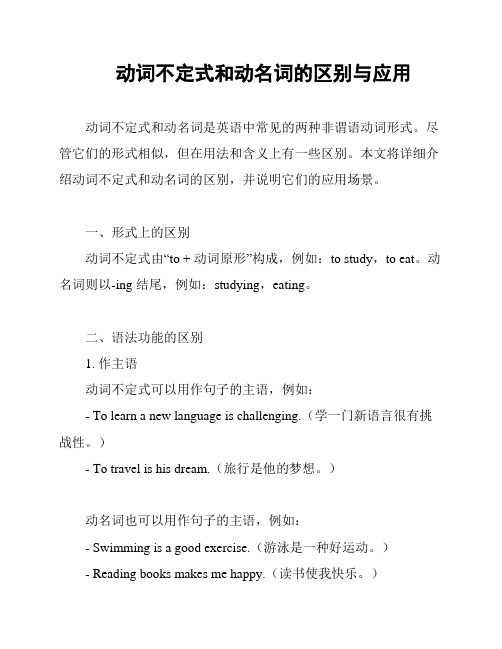
动词不定式和动名词的区别与应用动词不定式和动名词是英语中常见的两种非谓语动词形式。
尽管它们的形式相似,但在用法和含义上有一些区别。
本文将详细介绍动词不定式和动名词的区别,并说明它们的应用场景。
一、形式上的区别动词不定式由“to + 动词原形”构成,例如:to study,to eat。
动名词则以-ing 结尾,例如:studying,eating。
二、语法功能的区别1. 作主语动词不定式可以用作句子的主语,例如:- To learn a new language is challenging.(学一门新语言很有挑战性。
)- To travel is his dream.(旅行是他的梦想。
)动名词也可以用作句子的主语,例如:- Swimming is a good exercise.(游泳是一种好运动。
)- Reading books makes me happy.(读书使我快乐。
)2. 作宾语动词不定式可以用作及物动词的宾语,例如:- I want to learn Spanish.(我想学西班牙语。
)- She likes to eat fruits.(她喜欢吃水果。
)动名词也可以用作及物动词的宾语,例如:- I enjoy swimming every morning.(我喜欢每天早上游泳。
)- He admitted stealing the money.(他承认偷了那笔钱。
)3. 作介词宾语动词不定式可以用作介词宾语,例如:- She is good at playing the guitar.(她弹吉他很好。
)- He is interested in learning Chinese.(他对研究中文感兴趣。
)动名词也可以用作介词宾语,例如:- They are looking forward to visiting Paris.(他们期待着去巴黎旅行。
)三、意义和用法的区别1. 动词不定式带有“to”的含义,表示目的、意图、可能性、建议等,例如:- I went to the store to buy some bread.(我去商店买面包。
动词的不定式与动名词的区别

动词的不定式与动名词的区别动词的不定式(infinitive)和动名词(gerund)是英语中两种常见的非谓语动词形式。
尽管在形式上它们有一些相似之处,但在用法和含义上有明显的区别。
本文将详细介绍动词的不定式和动名词的区别,以便读者更好地理解和运用它们。
一、形式上的区别1. 动词的不定式通常由“to + 动词原形”构成,例如:to learn,to eat,to go等。
2. 动名词则是在动词原形后面直接加上-ing,例如:learning,eating,going等。
二、用法上的区别1. 主语的区别:a) 不定式作为主语:不定式一般用作主语时,表示一种抽象的行为、概念或目的。
例如:- To learn a new language is challenging.(学一门新语言很有挑战性。
)b) 动名词作为主语:动名词用作主语时,表示一种具体的、实际的行为或活动。
例如:- Reading helps expand your vocabulary.(阅读有助于扩大你的词汇量。
)2. 宾语的区别:a) 不定式作为宾语:不定式可以作为及物动词或不及物动词的宾语,常用于某些动词后,例如:want,hope,decide等。
例如: - She wants to learn Chinese.(她想学中文。
)b) 动名词作为宾语:动名词一般用作及物动词的宾语,常用于某些动词后,例如:enjoy,like,dislike等。
例如:- He enjoys swimming in the ocean.(他喜欢在海里游泳。
)3. 表语的区别:a) 不定式作为表语:不定式可以用作表语,通常用于表示完成、未来或可能性等。
例如:- His dream is to become a doctor.(他的梦想是成为一名医生。
)b) 动名词作为表语:动名词不常用作表语。
4. 定语的区别:a) 不定式作为定语:不定式可以用作修饰名词或代词的定语,常用于表示目的、原因或解释等。
不定式与动名词作宾语的区别

不定式与动名词作宾语的区别
1.动词不定式作宾语的时候,宾语的动作时间与谓语动作时间大多数情况下不是同一个时间,谓语时间一般在宾语时间之前;只有少数场合下谓语和宾语的时间是同一个时间。
此外,动词不定式作宾语突出动作性和动作的一次性。
例如:
He wants to go now.
他现在想走。
(want发生在go之前)
Would you like to have a cup of coffee?
你想来杯咖啡吗?
(like发生在havea cup of coffee之前,并且havea cup of coffee是一次性的)
We like to play chess.
我们喜欢下象棋。
(play chess在这里是指经常性的活动,而非一次性的活动)
2.动名词作宾语的时候,宾语动作的时间和谓语动作的时间是同步的,同时发生或者同时结束。
动名词还突出动作的经常性。
例如:
他已经完成写作。
√He has finished writing.
(finished和writing是同时结束的)
×He has finished to write.
(towrite发生在finished后面,这个讲不通) 许多男生喜欢唱歌。
√Many boys enjoy singing.
(enjoy和singing是同时发生的)
×Many boys enjoy to sing.
(enjoy发生在sing前面,这个不符合实际) 男生保持享受1分钟。
√The boy kept smiling for one minute.。
动词不定式和动名词作主语和宾语的用法

动词不定式和动名词作主语和宾语的用法动词不定式和动名词在英语中扮演着非常重要的角色,它们常常被用作句子的主语和宾语。
这两种形式在使用上有些许不同,下面我们就来详细介绍一下动词不定式和动名词作为主语和宾语的用法。
一、动词不定式动词不定式是由动词原形加上to构成的,例如:to eat,to play,to go等。
动词不定式作为主语时,常常表示一个动作或者行为的潜在性或可能性,比如:1. To learn a new language is not easy.(学习一门新语言并不容易。
)2. To travel around the world is my dream.(环游世界是我的梦想。
)3. To succeed in life, you need to work hard.(要在生活中获得成功,你需要努力工作。
)动词不定式作为主语时通常位于句子的开头,后面紧跟着谓语动词和其他成分。
从以上例句可以看出,动词不定式作为主语强调的是一个抽象的行为或动作,而不是具体的人或物。
动词不定式作为宾语时,可以跟在某些及物动词后面,如hope, want, try, plan等,也可以跟在某些名词后面,如ability, decision, desire, intention等。
例如:动词不定式和动名词作为主语和宾语时,它们的主要区别在于动词不定式更多地强调一个抽象的或可能性的行为,而动名词更多地强调一个普遍的或经常性的行为。
在实际运用中,我们需要根据具体的语境和表达的意思来选择使用哪种形式,以便更准确地表达我们的意思。
希望本文的介绍能够帮助读者更加清晰地理解动词不定式和动名词作为主语和宾语的用法。
动词不定式与动名词的区别
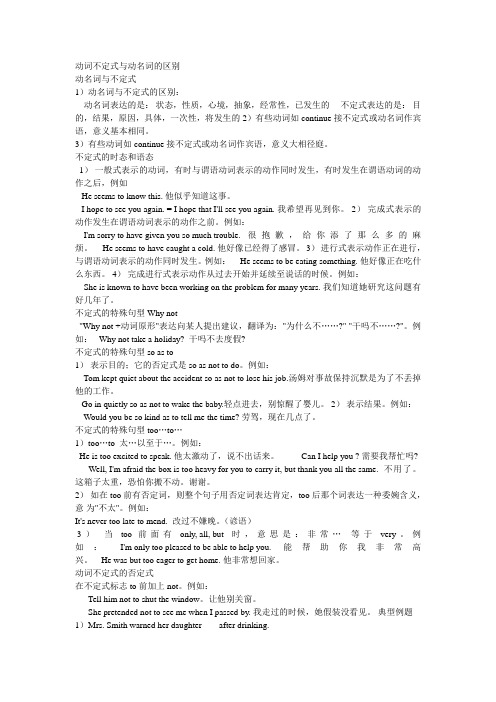
动词不定式与动名词的区别动名词与不定式1)动名词与不定式的区别:动名词表达的是:状态,性质,心境,抽象,经常性,已发生的不定式表达的是:目的,结果,原因,具体,一次性,将发生的 2)有些动词如continue接不定式或动名词作宾语,意义基本相同。
3)有些动词如continue接不定式或动名词作宾语,意义大相径庭。
不定式的时态和语态1)一般式表示的动词,有时与谓语动词表示的动作同时发生,有时发生在谓语动词的动作之后,例如He seems to know this. 他似乎知道这事。
I hope to see you again. = I hope that I'll see you again. 我希望再见到你。
2)完成式表示的动作发生在谓语动词表示的动作之前。
例如:I'm sorry to have given you so much trouble. 很抱歉,给你添了那么多的麻烦。
He seems to have caught a cold. 他好像已经得了感冒。
3)进行式表示动作正在进行,与谓语动词表示的动作同时发生。
例如: He seems to be eating something. 他好像正在吃什么东西。
4)完成进行式表示动作从过去开始并延续至说话的时候。
例如:She is known to have been working on the problem for many years. 我们知道她研究这问题有好几年了。
不定式的特殊句型Why not"Why not +动词原形"表达向某人提出建议,翻译为:"为什么不……?" "干吗不……?"。
例如: Why not take a holiday? 干吗不去度假?不定式的特殊句型so as to1)表示目的;它的否定式是so as not to do。
动词不定式与动名词的的区别
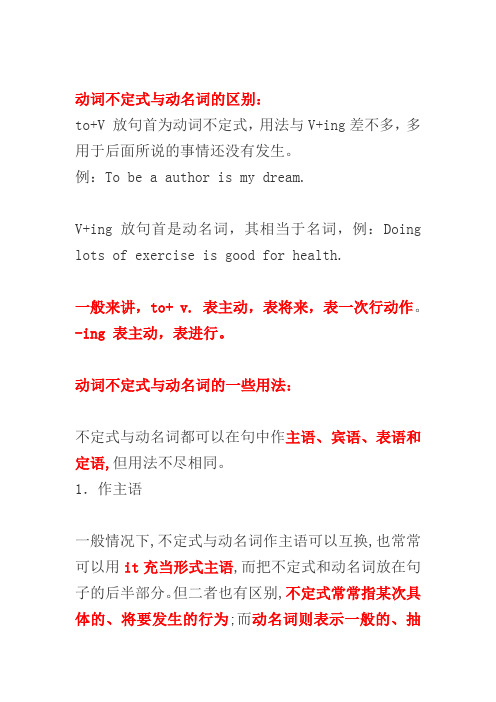
动词不定式与动名词的区别:
to+V 放句首为动词不定式,用法与V+ing差不多,多用于后面所说的事情还没有发生。
例:To be a author is my dream.
V+ing 放句首是动名词,其相当于名词,例:Doing lots of exercise is good for health.
一般来讲,to+ v. 表主动,表将来,表一次行动作。
-ing 表主动,表进行。
动词不定式与动名词的一些用法:
不定式与动名词都可以在句中作主语、宾语、表语和定语,但用法不尽相同。
1.作主语
一般情况下,不定式与动名词作主语可以互换,也常常可以用it充当形式主语,而把不定式和动名词放在句子的后半部分。
但二者也有区别,不定式常常指某次具体的、将要发生的行为;而动名词则表示一般的、抽
象的行为。
例如:
To save money now is not easy. 现在攒钱不容易。
Saving money is a good habit. 攒钱是个好习惯。
2.作定语
不定式多为后置定语,动名词多为前置定语;不定式多表示将来的动作,动名词只能表示事物的属性、用途等。
例如:
He is looking for a room to live in.他正在找一间房子去住。
Take these sleeping pills and you\'ll sleep better. 吃了这种安眠药,你会睡得更好。
3.作宾语:
有些动词后只能跟不定式作宾语,不能跟动名词作宾语;有些动词后常跟动名词作宾语,不能跟不定式作宾语。
有的两个皆可。
动名词和动词不定式作宾语的异同

浅析动名词和动词不定式作宾语的异同摘要:动名词和动词不定式是英语学习的难点之一,也是高考、大学英语等级考试等的重点内容之一。
本文着重介绍动名词和不定式做宾语的五种基本情况,比较两者做宾语时结构和意义的异同,以帮助英语学习者快速准确掌握。
关键词:动名词动词不定式宾语非谓语动词英语中作为非谓语动词的动名词和不定式都可以作宾语,但究竟什么情况该用动名词?什么情况用动词不定式?两者都可以用时,意义有无区别?这些问题一直困扰英语学习者。
笔者认为,只要准确掌握了下面五种情况,解决了这五个问题,上述困扰就会迎刃而解。
问题一:哪些动词后面既可以接动名词,又可以接不定式作宾语,且意义无甚差别或者差别不大?这类动词常用的有:advise,attempt,begin,can’t bear,cease,choose,commence,consider,continue,dread,hate,intend,like,love,neglect,omit,plan,prefer,propose,start等。
如:xiao wang’s parents planned taking/to take a holiday abroad.小王的爸妈打算去国外度假。
they start working / to work at eight every morning.他们每天8点上班。
he neglected locking /to lock the door.他忘了锁门了。
问题二:哪些动词后面只能接动名词?只能接动名词作宾语的常用动词有:admit,acknowledge,advocate,anticipate,appreciate,approve,avoid,catch,consider,contemplate,can’t help,defer,delay,deny,detest,despise,endure,ensure,enjoy,escape,evade,excuse,facilitate,fancy,favour,feel like,finish,forgive,give up,grudge,imagine,include,involve,keep(on),leave off,loathe,mention,mind,miss,pardon,postpone,practise,put off,recall,recollect,resent,resist,resume,risk,save,stand(忍受),stop,suggest,understand等。
动词不定式和动名词做宾语的区别

动词不定式和动名词做宾语的区别一、只能接动词不定式to do(作宾语)的动词:hope, expect, agree, promise, intend, plan, want, manage, decide, determine,attempt, pretend, choose,offer, refuse, fail 等。
例如:They all want to play football after class.二、1.只能接动词-ing形式(作宾语)的动词(短语):finish,mind ,admit ,allow ,appreciate ,avoid ,consider ,delay ,enjoy ,imagine ,keep ,miss ,permit practise , risk ,suggest 等。
例如:I admit breaking the window.2.有些短语动词和结构后面也要求跟动名词作宾语。
这样的短语动词常见的有:insist on, be worth,give up,put off,keep on,insist on,look forward to,can't help, be/get used to,spend...in , feel like 等3.在一些特别的句子结构中要求使用动名词:1.) “have problem (+in) + 动名词,2.) have difficulty in doing sth.,3.) be busy (in) + 动名词;4.) waste time (in) + 动名词;5.) There is no use + doing三、在remember,forget, regret, stop,mean 等及物动词后,既可接doing作宾语又可接to do作宾语,但意义不同。
动名词作主语(如果一个动词加上了ing变成了名词,那么这个词称动名词)动名词作主语有如下几种常见情况:1. 直接位于句首做主语。
动词不定式和动名词的用法和区别详解

动词不定式和动名词的用法和区别详解动词不定式是由动词原形加上to构成的形式,通常作为动词、形容词或副词的宾语、补语、定语或状语。
动词不定式可以表示目的、结果、愿望、能力、需要、义务等含义。
动名词是由动词加上-ing构成的形式,可以作为名词的主语、宾语、定语或表语。
动名词通常表示行为或状态的持续性或重复性。
两者的区别如下:1. 形式上的区别:- 动词不定式以to开头,如to eat、to sleep。
- 动名词以-ing结尾,如eating、sleeping。
2. 用法上的区别:- 动词不定式通常用作动词的宾语,如I want to eat。
它可以跟在某些动词后面,如want、like、hope等,构成不定式短语。
- 动名词通常可以用作名词的主语、宾语或表语,如Smokingis bad for health。
3. 意义上的区别:- 动词不定式强调的是动作的目的、结果、愿望、能力等。
例如,I want to learn English。
在这个句子中,不定式to learn强调的是想要研究英语的目的。
- 动名词强调的是动作的持续性或重复性。
例如,I enjoy swimming。
在这个句子中,动名词swimming强调的是游泳这个持续性的动作带来的愉悦感。
需要注意的是,有些动词后既可以接动词不定式,也可以接动名词,但意义可能会有所不同。
例如,I like swimming和I like to swim的意思虽然都是“我喜欢游泳”,但前者强调的是游泳这个动作本身,而后者强调的是我想要做游泳这个动作。
总结起来,动词不定式和动名词在形式、用法和意义上存在一些区别。
了解这些区别有助于我们正确使用它们,并更好地理解英语句子的含义和表达方式。
参考资料:- 李强,牛津英语语法详解,外语教学与研究出版社,2001年。
动词不定式与动名词作宾语的区别

动词不定式与动名词作宾语的区别英语中有的及物动词只能跟动名词作宾语;有的及物动词只能跟动词不定式作宾语;但也有及物动词的宾语既是动名词又是动词不定式.区别在于:一、在want,decide,promise,refuse,agree,wish,hope,expect等及物动词后面的宾语只能是动词不定式,不是动名词.如:1。
I want to have a talk with her.我想跟她谈谈.2。
Our teacher decided to stay with us.老师决定留下来与我们在一起。
3。
My English teacher promised to lend some books to me.我的英语老师答应借给我一些书。
4.My mother refused to go there with us。
我妈妈拒绝和我们一起去那里。
二、在一些动词后要求只跟动名词作宾语:1、在finish,enjoy,mind,suggest,practise,admit承认advise建议allow 允许appreciate 感激,avoid避免,consider考虑,delay推迟,deny 否认,discuss 讨论,dislike 不喜欢,enjoy 喜爱,escape 逃脱,excuse 原谅,fancy 设想,finish 完成,forbid 禁止,forgive 原谅,give up 放弃,imagine 想像,keep 保持,mention 提及,mind 介意 miss 没赶上,pardon 原谅,permit允许,practise练习,prevent 阻止,put off 推迟,report 报告,risk 冒险,stop 停止,suggest 建议,understand 理解。
1.I advise waiting a few more days。
我建议再等几天。
2.I admit breaking the window. 我承认窗子是我打破的。
动名词的用法与不定式的区别

动名词的用法与不定式的区别动名词和不定式都是英语中常见的非谓语动词形式,但它们在用法上有一些区别。
动名词的用法1. 作主语:动名词可以作为句子的主语。
- 例:Swimming is my favorite sport.(游泳是我最喜欢的运动。
)2. 作宾语:动名词可以作为动词的宾语。
- 例:I enjoy reading novels.(我喜欢读小说。
)3. 作介词的宾语:动名词可以作为介词的宾语。
- 例:He is good at playing the guitar.(他擅长弹吉他。
)4. 作动词的宾语:某些动词后面只能跟动名词作宾语。
- 例:I can't help crying when I watch sad movies.(当我看悲伤的电影时,忍不住哭泣。
)5. 作状语:动名词可以作为句子的状语。
- 例:She left the room, slamming the door behind her.(她离开房间时关上了门。
)不定式的用法1. 作目的状语:不定式可以表示一个动作或一个状态的目的。
- 例:I went to the bookstore to buy a new book.(我去书店买了一本新书。
)2. 作方式状语:不定式可以表示动作的方式和方法。
- 例:He opened the door to let fresh air in.(他打开门让新鲜的空气回来。
)3. 作结果状语:不定式可以表示一个动作或一个状态的结果。
- 例:She studied hard to pass the exam.(她努力研究以通过考试。
)4. 作定语:不定式可以修饰名词或代词。
- 例:I have a book to read tonight.(我今晚有本书要读。
)5. 作宾语:某些动词后面只能跟不定式作宾语。
- 例:I want to go on vacation.(我想去度假。
)总结动名词和不定式在用法上有一些区别。
动名词和不定式的区别与用法
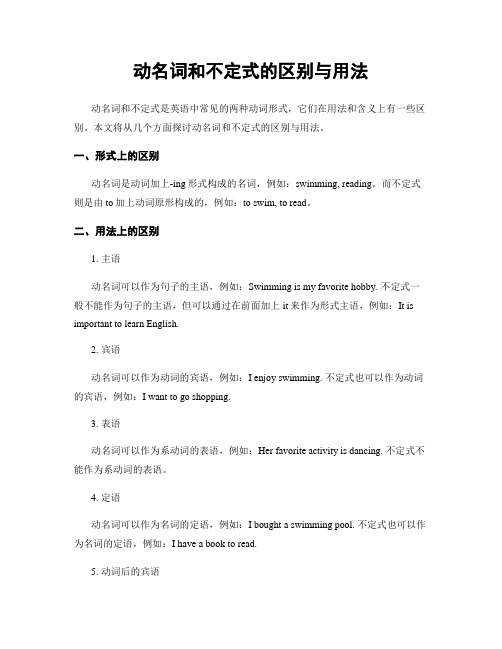
动名词和不定式的区别与用法动名词和不定式是英语中常见的两种动词形式,它们在用法和含义上有一些区别。
本文将从几个方面探讨动名词和不定式的区别与用法。
一、形式上的区别动名词是动词加上-ing形式构成的名词,例如:swimming, reading。
而不定式则是由to加上动词原形构成的,例如:to swim, to read。
二、用法上的区别1. 主语动名词可以作为句子的主语,例如:Swimming is my favorite hobby. 不定式一般不能作为句子的主语,但可以通过在前面加上it来作为形式主语,例如:It is important to learn English.2. 宾语动名词可以作为动词的宾语,例如:I enjoy swimming. 不定式也可以作为动词的宾语,例如:I want to go shopping.3. 表语动名词可以作为系动词的表语,例如:Her favorite activity is dancing. 不定式不能作为系动词的表语。
4. 定语动名词可以作为名词的定语,例如:I bought a swimming pool. 不定式也可以作为名词的定语,例如:I have a book to read.5. 动词后的宾语动名词可以直接跟动词后的宾语,例如:She enjoys swimming pools. 不定式一般需要用介词来连接动词后的宾语,例如:She wants to go to the swimming pool.6. 动词的完成形式动名词可以和完成时态连用,例如:I regret not studying harder. 不定式不能和完成时态连用,例如:I regret not to have studied harder.三、意义上的区别1. 动名词表示正在进行的动作或习惯性的动作,强调动作本身。
例如:I enjoy swimming. (我喜欢游泳)2. 不定式表示将来的动作或目的,强调动作的目的或意图。
常用句型动名词与不定式的区别

常用句型动名词与不定式的区别动名词和不定式作为英语语法中常用的词组形式,经常被用于表达特定的含义和语境。
本文将重点介绍动名词与不定式的区别,以帮助读者更好地理解和使用这两种句型。
一、定义和形式1. 动名词(Gerund)是动词的一种形式,以-ing结尾,并且在句中充当名词的角色。
动名词的形式为动词的原形 + -ing,例如:reading, swimming, studying等。
2. 不定式(Infinitive)是动词的一种形式,一般由“to + 动词原形”构成。
例如:to read, to swim, to study等。
二、句法用法1. 主语和宾语(1)动名词作为主语,常用于表达一般性的或已经完成的动作。
例如:Swimming is my favorite hobby.(游泳是我最喜欢的爱好。
)(2)不定式作为主语,常用于表达将来的或可能的动作。
例如:To travel around the world is my dream.(环游世界是我的梦想。
)(3)动名词作为宾语,常用于及物动词之后。
例如:I enjoy swimming in the ocean.(我喜欢在海洋中游泳。
)(4)不定式作为宾语,常用于及物动词之后,并带有to。
例如:She wants to go shopping this weekend.(她想在这个周末去购物。
)2. 补语(1)动名词作为补语,常用于及物动词之后。
例如:I find it interesting watching movies.(我发现看电影很有趣。
)(2)不定式作为补语,常用于及物动词之后,并带有to。
例如:She considers him to be a good friend.(她认为他是个好朋友。
)3. 定语和状语(1)动名词作为定语,修饰名词。
例如:I have a swimming lesson tomorrow.(我明天有一节游泳课。
动词不定式与动名词的区别与用法比较动词不定式与动名词的语法结构与用法
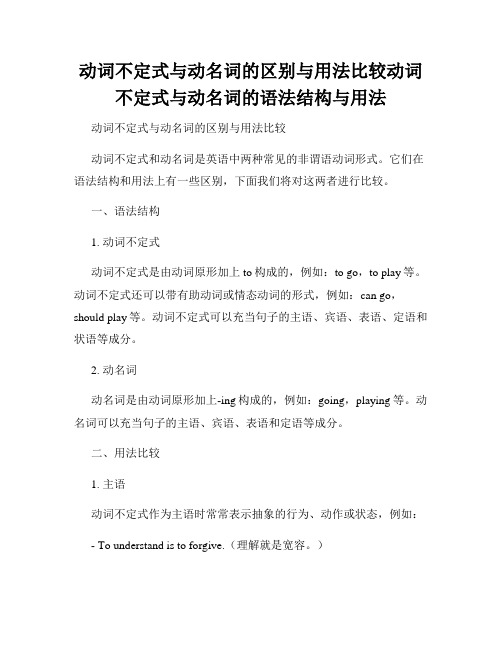
动词不定式与动名词的区别与用法比较动词不定式与动名词的语法结构与用法动词不定式与动名词的区别与用法比较动词不定式和动名词是英语中两种常见的非谓语动词形式。
它们在语法结构和用法上有一些区别,下面我们将对这两者进行比较。
一、语法结构1. 动词不定式动词不定式是由动词原形加上to构成的,例如:to go,to play等。
动词不定式还可以带有助动词或情态动词的形式,例如:can go,should play等。
动词不定式可以充当句子的主语、宾语、表语、定语和状语等成分。
2. 动名词动名词是由动词原形加上-ing构成的,例如:going,playing等。
动名词可以充当句子的主语、宾语、表语和定语等成分。
二、用法比较1. 主语动词不定式作为主语时常常表示抽象的行为、动作或状态,例如:- To understand is to forgive.(理解就是宽容。
)- To love someone is to accept them for who they are.(爱一个人就是接受他们的真实面貌。
)动名词作为主语时常常表示一般的、具体的动作或状态,例如:- Swimming is good for health.(游泳对健康有好处。
)- Eating too much junk food can lead to health problems.(吃太多垃圾食品会导致健康问题。
)2. 宾语动词不定式作为及物动词的宾语时,在一些动词后面常常跟上动词不定式,例如:- I want to go shopping.(我想去购物。
)- She loves to sing.(她喜欢唱歌。
)动名词作为宾语时,常常跟动词之后,例如:- I enjoy swimming in the sea.(我喜欢在海里游泳。
)- They avoid talking about the problem.(他们避免谈论这个问题。
)3. 表语动词不定式作为表语时,常常表示主语的性质、身份、目的等,例如:- His dream is to become a famous singer.(他的梦想是成为一名著名的歌手。
动名词与不定式的区别与运用
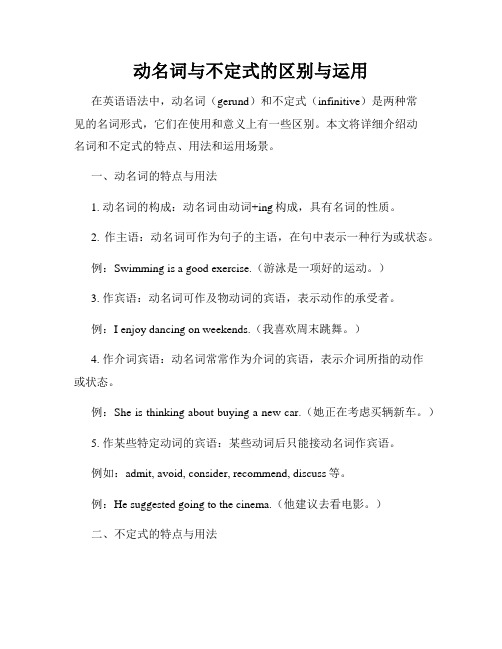
动名词与不定式的区别与运用在英语语法中,动名词(gerund)和不定式(infinitive)是两种常见的名词形式,它们在使用和意义上有一些区别。
本文将详细介绍动名词和不定式的特点、用法和运用场景。
一、动名词的特点与用法1. 动名词的构成:动名词由动词+ing构成,具有名词的性质。
2. 作主语:动名词可作为句子的主语,在句中表示一种行为或状态。
例:Swimming is a good exercise.(游泳是一项好的运动。
)3. 作宾语:动名词可作及物动词的宾语,表示动作的承受者。
例:I enjoy dancing on weekends.(我喜欢周末跳舞。
)4. 作介词宾语:动名词常常作为介词的宾语,表示介词所指的动作或状态。
例:She is thinking about buying a new car.(她正在考虑买辆新车。
)5. 作某些特定动词的宾语:某些动词后只能接动名词作宾语。
例如:admit, avoid, consider, recommend, discuss等。
例:He suggested going to the cinema.(他建议去看电影。
)二、不定式的特点与用法1. 不定式的构成:不定式由to + 动词原形构成,具有名词、形容词或副词的性质。
2. 作主语:不定式可作为句子的主语,常用于表示抽象的概念、信念或理想。
例:To learn a foreign language requires patience and perseverance.(学习一门外语需要耐心和毅力。
)3. 作宾语:不定式可作及物动词的宾语,常与动词一起构成某些固定搭配。
例:She promised to help me with my homework.(她答应帮我做作业。
)4. 作目的状语:不定式可表示动作、状态的目的或用途。
例:I went to the store to buy some groceries.(我去商店买些杂货。
- 1、下载文档前请自行甄别文档内容的完整性,平台不提供额外的编辑、内容补充、找答案等附加服务。
- 2、"仅部分预览"的文档,不可在线预览部分如存在完整性等问题,可反馈申请退款(可完整预览的文档不适用该条件!)。
- 3、如文档侵犯您的权益,请联系客服反馈,我们会尽快为您处理(人工客服工作时间:9:00-18:30)。
动词不定式与动名词作宾语的区别英语中有的及物动词只能跟动名词作宾语;有的及物动词只能跟动词不定式作宾语;但也有及物动词的宾语既是动名词又是动词不定式。
区别在于:一、在want,decide,promise,refuse,agree,wish,hope,expect等及物动词后面的宾语只能是动词不定式,不是动名词。
如:1.I want to have a talk with her.我想跟她谈谈。
2.Our teacher decided to stay with us.老师决定留下来与我们在一起。
3.My English teacher promised to lend some books to me.我的英语老师答应借给我一些书。
4.My mother refused to go there with us.我妈妈拒绝和我们一起去那里。
二、在一些动词后要求只跟动名词作宾语:1、在finish,enjoy,mind,suggest,practise,admit承认advise建议allow允许appreciate 感激,avoid避免,consider考虑,delay推迟,deny 否认,discuss 讨论,dislike 不喜欢,enjoy 喜爱,escape 逃脱,excuse 原谅,fancy 设想,finish 完成,forbid 禁止,forgive 原谅,give up 放弃,imagine 想像,keep 保持,mention 提及,mind 介意 miss 没赶上,pardon 原谅,permit 允许,practise练习,prevent 阻止,put off 推迟,report 报告,risk 冒险,stop 停止,suggest 建议,understand 理解。
1.I advise waiting a few more days. 我建议再等几天。
2.I admit breaking the window. 我承认窗子是我打破的。
3.Try to imagine being on the moon. 设法想像你是在月球上。
4.He tried to escape being punished. 他设法逃避惩罚。
5.You shouldn’t keep thinking about it. 你不应老想着这事。
6.Would you mind going with her? 你可否同她一起去?7.I can’t understand neglecting children like that. 对孩子那样毫不经心,我不能理解。
8.We only missed seeing each other by five minutes. 我们只因差五分钟而未能见面。
9.Would you mind opening the window?打开窗好吗?10.These books are well worth reading.这些书值得读。
11.My mother couldn't help smiling when she heard the good news.听到那好消息,我妈妈情不自禁地笑起来。
12.My father has given up smoking.我父亲戒烟了。
13.Everyone in my class enjoys playing football.我班人人喜欢踢足球。
14.Mike often attempts to escape being fined whenever he breaks traffic regulations.15.The doctor suggested that I avoid smoking and drinking for a month.16.Would you mind opening the window?17.The murderer denied killing the rich man.18.I would appreciate your keeping it a secret.2、有些短语动词和结构后面也要求跟动名词作宾语。
这样的短语动词常见的有:insist on, be worth,object/objection to,put off,keep on,insist on,leave off,look forward to,think of, can't help, be/get used to, spend...in , can’t stand 忍不住; feellike 想,欲;give up 放弃; put off 推迟,can’t help 忍不住,go on等。
如:1. Do you feel like going out for dinner with me tonight?2. Chinese people are looking forward to holding the 27th Olympic games.3. I am used to going to bed late and getting up late.4. Although punctual himself, the professor was quite used to students' being late for his lecture.5. I have no objection_to hearing your story again.6. He put off making a decision till he had more information.在获得详情之前,他没有急于作出决定。
7. Do you feel like taking a walk?你要不要去散步?8. We are looking forward to coming to China.我们期待着来中国。
9. We succeeded in getting over all the difficulties.我们终于克服了所有的困难。
3、在一些特别的句子结构中要求使用动名词:1. “have problem (+in) + 动名词,2. have fun (+in) + 动名词,3. have difficulty in doing sth.,4. have trouble/a hard time in doing sth.;5. be busy (in) + 动名词;6. waste time (in) + 动名词;lose time (in) + 动名词;以上动名词做介词宾语,in常要省去。
例如:The children are busy doing their homework.。
孩子们忙于做作业。
4、在下列结构中动名词作主语。
“There is(was) no + doing”结构中作主语。
there be no need + 动名词,There is no point (in) + 动名词”等结构中,There is no point (in) making the simple experiments once again.再做一次这种简单的实验是毫无意义的。
There is no denying that she is very efficient. 她效率高是不容否认的。
5、当动名词做主语时,我们常用先行词it作形式主语,而把真正的主语动名词放到句尾,特别要注意如下结构:1. It is useless (no use, no good, fun, no harm, a waste of time,a good pleasure) doing...2. It is a waste of time doing...3. It is worthwhile doing...【例如】It is no use crying over spilt milk.It is a waste of time discussing such matters with him.It is no good leaving today's work for tomorrow.6、动名词在demand, deserve, need, require, want等动词后面作宾语时,表示被动的意思。
【例如】1. My shoes need mending.2. The following language points deserve mentioning.3. This matter demands discussing.4. Your hair wants cutting.It is no good writing to him; he never answers letters.写信给他不妥,他从来不回信。
It is no use your complaining; the company won’t do anything about it.抱怨是没有用的,公司是不会管的。
It is good playing chess after supper.晚饭后弈棋挺好。
It is useless speaking.光说是没有用的。
三、在begin,start,like,hate,remember,forget等及物动词后,既可用动名词作宾语又可用动词不定式作宾语,但意义不同。
1、在like后用动名词作宾语,表示“习惯或爱好”,时间不明确。
其后接动词不定式作宾语,表示“喜欢要做的某一特定动作”,时间明确。
如:1)He likes playing basketball.她喜欢打篮球。
(爱好)2)We don't like to play football today.我们今天不想踢足球。
(指活动)2、在like,hate后接动名词作宾语时,动名词这个动作的发出者,可能是句子的主语或者是指其他人。
如:1)My friend likes singing.我的朋友喜欢唱歌。
(可能自己喜欢唱,也可能喜欢别人唱)2)My friend likes to sing.我朋友喜欢唱。
(自己唱)3)I hate to smoke.我不喜欢吸烟。
(指自己不吸烟)4)My mother hates smoking.我母亲反对吸烟。
(自己不吸,也反对别人吸)3 在begin,start后接动名词作宾语,表示有意识地“开始”;接动词不定式表示无意识地“开始”。
如:1)She began to study Chinese after she came to Chine.她来中国后就开始学汉语。
